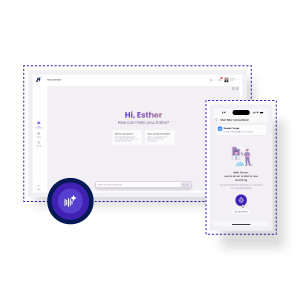In contemporary health care, no individual works in a vacuum. Medical care nowadays is provided by a team it is particularly so in the case of chronic illness, multiple specialists, and complex treatment regimens. That’s where MDT assistants in coordinated patient care come in.
These are not mere office assistants. They make multidisciplinary teams work together, ensuring the exchange of information, documentation, and that patients do not become lost in the gaps. Now it is time to REALLY take a deeper look at why MDT assistants become vital, and how HealthOrbit AI helps to make the process work behind the scenes.
The 7 Reasons to Identify the Importance of MDT Assistants?
In today’s team-based healthcare environments, the role of MDT assistants in coordinated patient care has never been more essential. According to a quality improvement research, implementing an ambient AI system enhanced clinician satisfaction and cognitive burden while drastically cutting down on the amount of time needed for documentation for each consultation.. They are not clerical personnel but are connectors, communicators, and facilitators of greater results. These are seven reasons why they are all different:
- They Fill the Fields of Specialty Gaps
When a patient has more than one provider, the primary care, specialty care, and/or a therapist, it is simple to lose information. Multidisciplinary team assistants in patient care ensure nothing gets lost in translation. They facilitate integration of updates between providers, communication, and ensure that everyone is on the same care plan.
- They Enhance the Flow of Information
Clinical settings have very high stakes so even the tiniest misunderstanding may cause a slowdown in care. The role of MDT assistants in healthcare includes managing notes, updates, and clinical summaries so the right people have the right information—fast. Combine that with software that provides systematic AI clinical notes, and the staff remains on the same page.
- They Support Accurate Documentation
Accurate records aren’t just nice to have—they’re critical. MDT coordination in hospitals relies on clean, current documentation. MDT assistants help keep charts updated and organized, especially when using platforms that support EHR Integration and automated AI medical Billing for smooth claim submissions.
- They Reduce Admin Burden for Clinicians
Doctors and nurses are often overwhelmed by paperwork. MDT assistants in coordinated patient care take on some of that load by handling communication, prepping for care team huddles, and organizing follow-ups. That means clinicians spend more time treating and less time typing.
- They Keep Chronic Care on Track
When managing long-term conditions, missed labs or check-ins can have serious consequences. With MDT support for chronic care patients, assistants ensure consistent follow-up, track progress, and keep the entire team aligned. It’s proactive care made possible by good coordination.
- They Enhance Compliance and Patient Safety
Healthcare is filled with rules, and for good reason. From documentation standards to HIPAA Compliance, MDT assistants help uphold regulatory guidelines, catch gaps in care plans, and make sure sensitive info stays protected. With the right tools, they can monitor updates securely without manual errors.
- They Make the System Work for Patients
At the end of the day, it’s about patient outcomes. The importance of MDT assistants lies in their ability to make care more connected, responsive, and human. Whether they’re coordinating across departments or supporting real-time documentation through solutions like HealthOrbit AI, they help transform fragmented systems into true team-based care.
The HealthOrbit AI Advantage?
Team-based care only works when the tools behind it support collaboration. That’s where HealthOrbit AI steps in—not as another platform to learn, but as a quiet partner working in the background to keep documentation smooth, accurate, and compliant.
Whether you’re managing a fast-paced hospital department or coordinating long-term care across multiple specialties, HealthOrbit AI gives MDT assistants in coordinated patient care the support they need to stay ahead. Here’s what makes it stand out:
- Automatically captures and formats conversations into clear, consistent AI clinical notes.
- Follows SOAP Note structure to support continuity of care and make handoffs easier.
- Syncs directly with your existing EHR system—no need for double entry or copy-paste work.
- Prepares documentation that’s optimized for AI Bill Coding tools.
- Reduces claim denials by improving accuracy and completeness.
- Keeps patient trust intact while supporting collaborative care.
- Reduces chaos, admin stress, and late-night documentation sessions.
Final Thoughts
Coordinated care doesn’t happen by accident. It takes people behind the scenes—like MDT assistants in coordinated patient care—to make it work.
From managing communication to supporting chronic care plans, MDT assistants play a huge role in keeping patients safe, clinicians informed, and treatment plans on track. And when they’re backed by tech that fits seamlessly into the clinical routine? The entire care experience improves.
If your team is juggling too many tools or struggling with documentation, maybe it’s time to make HealthOrbit AI part of your workflow. Because better support behind the scenes means better care upfront.
Try HealthOrbit AI today and experience the difference real-time support can make.
FAQs
What exactly does an MDT assistant do in patient care?
MDT assistants help manage communication, coordinate care plans, ensure timely documentation, and support the overall workflow of multidisciplinary teams.
How do MDT assistants support chronic care?
They track care milestones, manage updates across specialties, and keep treatment plans on course, especially for patients with long-term conditions.
Can MDT assistants help with billing and documentation?
Absolutely. By supporting structured notes and using platforms that integrate AI Bill Coding, MDT assistants help reduce claim errors and improve revenue cycles.
How does HealthOrbit AI help MDT assistants?
HealthOrbit AI offers tools that generate structured AI clinical notes, sync directly into EHR systems, and ensure HIPAA Compliance, giving assistants the support they need to work more efficiently.
Is this solution secure?
Yes. HealthOrbit AI is built with privacy in mind and supports all necessary compliance protocols, including end-to-end HIPAA Compliance for peace of mind.




